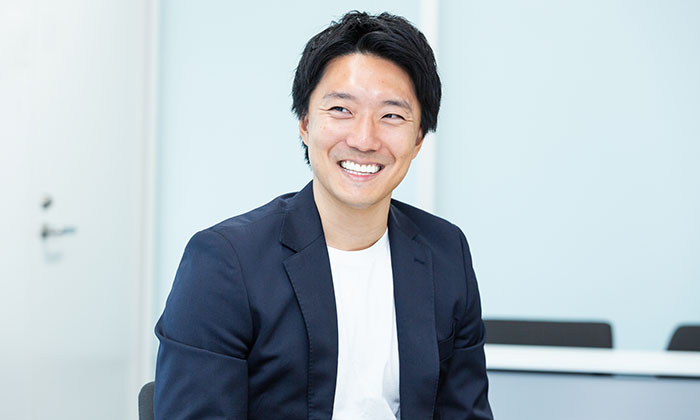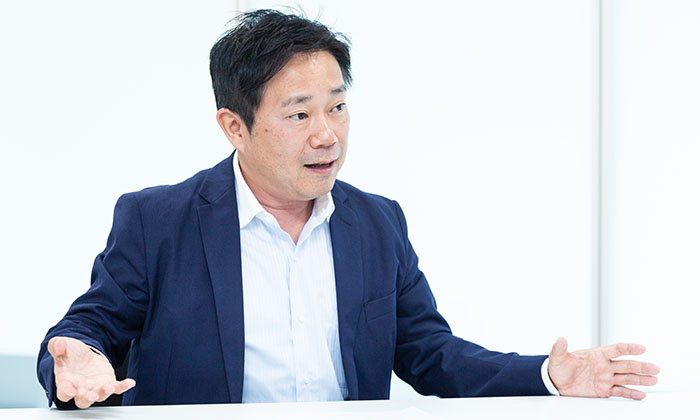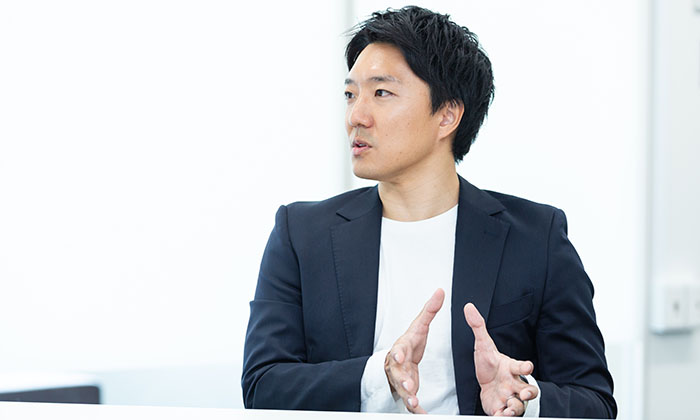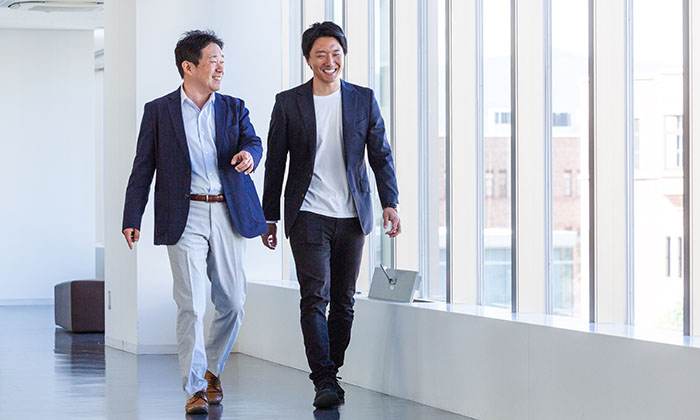Contact UsCONTACT
Please feel free to contact us if you have any questions or concerns.
Inquiry FormStories
STORIES
SERIES EMBARK
![[Special Edition] The first EIR-iCAP startup is born (Part1)](https://www.kyoto-unicap.co.jp/cms/wp-content/uploads/rhino-eyecatch1.jpg)
Atushi Alex Mazawa, who has been a student at Kyoto-iCAP since February 2023 as the first student of the EIR-iCAP (EIR: Entrepreneur in Residence, visiting entrepreneur) program promoted by Kyoto-iCAP, established Rhinoflux Inc. in April 2024. The company is an energy startup that develops power generation devices that "reduce CO₂ emissions the more power is generated" based on a new power generation technology invented by Ryuichi Ashida, a lecturer at Kyoto University's Graduate School of Engineering. In this special edition of the "Launching Story," we present a conversation between Atushi Alex Mazawa, CEO of Rhinoflux Inc., and Nobuhiro Yagi, Executive Officer and General Manager of Investment Department 1, Kyoto-iCAP, in two installments, the first and second parts of which will be published in this issue. In the first part, Mr. Mazawa, the first founder from EIR-iCAP, talked about the advantages of starting a business as a first-generation EIR-iCAP member and what improvements can be made for those who follow in his footsteps.
(Text: Yoji Yamamoto)
First of all, congratulations once again on your establishment, it has been six months since you started your business in April 2024, how are you doing now?
Yes, I started my own company, Rhinoflux Inc., in April 2024 and worked within Kyoto-iCAP until August 2024 to get it off the ground. My experience as an EIR was very helpful in starting the company. For example, Kyoto-iCAP has accumulated examples of failures and solutions by various startup presidents, which can be used as a reference for what to do when faced with similar challenges as a CEO. In this respect, I think we have a good starting point.


I am glad you started with good material. Now I am watching over you as if you were a parent.
Now, I told Mr. Mazawa about the three main goals of EIR-iCAP when he first arrived at EIR. The first point is "You can do whatever you want in your business. This means that we do not bind the business theme and expect the entrepreneur's motivation and driving force. The second point was, "The shareholding in Kyoto-iCAP will not be decided in advance. And third, "You will work as a capitalist. Now that you have started your own business, could you tell us how you think and feel about these three philosophies?
The first one, that I could do any kind of business, was a good opportunity for my life. Before I decided to start my own business using the current power generation technology, I was shown various technologies at Kyoto University, such as quantum computer technology and technology to explore water resources on the moon. I learned that the world is filled with such wonderful technologies, and finally I decided that this was the one. Now, this decision that I made on my own is what gives me the strength to keep going even when things are tough or don't go well. So this process was very good and important.
The second, not deciding on equity ownership, has both a superficial and an essential part. On the surface, it was nice that there was no absurdity in being able to decide on equity ownership as soon as you started your business. But the important and essential part was that you could decide for yourself who you wanted to receive your initial investment from. If I had decided on an equity stake in Kyoto-iCAP, I would have abandoned the process of thinking about it. What kind of shareholders would I bring in and what would I expect from them in order to grow this company? How will this directly lead to future growth? As the captain who decides for himself who will be the first members to board the ship, it was very significant for me to be able to think about who I would receive funding from.
The third point about working as a capitalist is useful now. In an uncertain world like a startup, it is not often possible to come up with logical, deductive answers. In practice, we have to take an inductive approach, where we derive results from facts. The key to an inductive approach is how well you know your sample. In this context, as I mentioned at the beginning, through my work as a capitalist, it was very important for me to have a database of a lot of information on failures and solutions of various companies, so that I could use it as one of the materials when making a decision on something. I am not sure to what extent I am able to utilize this information in practice, but as a CEO, I think it is a very good gasoline.
As expected of Mr. Mazawa. I was relieved to hear that answer. I thought that Rhinoflux was a solid board.

I would like to hear about any future improvements in terms of what would make it easier or more confident to start a business in EIR-iCAP.
Yes, I would have to say that I would have liked to have been able to get a little more clogs. This is a difficult question, but if I had to pick one, I would say that it would have been nice to have a little more geta when starting a business. A startup that started yesterday or today does not have the track record, network, and credibility that Kyoto-iCAP and Kyoto University have. What an unknown startup wants most is credibility and a track record, and I thought it would be good if we could help them get their feet wet in this area. I was given a lot of support in building the company, and there was a lot to absorb, but if I had been able to become an EIR, it would have been easier to launch the boat if I had been able to start from such an accumulated base. I thought that if entrepreneurs from EIR-iCAP could have the image of newcomers who were given a major debut by a well-known producer, it would create a flow of people who seriously want to start their own businesses.
That's right. When you are just starting out, you are all unknown newcomers. At that time, it is very understandable that the label "Kyoto-iCAP" or "Kyoto University graduate" should be like the Inro of Mito Koumon. For example, rather than making a sudden cold call to a business firm, we could be the first to offer our assistance. There are many alumni of Kyoto University, and there are also many companies that are collaborating with us. If this is very effective as support, we should be proactive. I believe that only through such activities will the label become effective. At the same time, I would like you to play a part in making the EIR-iCAP label shine brighter and brighter, although it may be a question of chicken first or egg first.
I hope that the EIR projects that come out in the future will spread their wings and people will think that EIR projects from Kyoto-iCAP have a good story to tell. As I was talking, I was thinking that if we can make our own achievements, we may be able to achieve this goal.
From this aspect, we believe it is important for EIR-iCAP to foster more business literacy. However, we would like to increase EIR-iCAP's fundamental strength as an organization that balances science and business by having people who have exited startups serve as advisors, as well as having people who have failed participate in EIR-iCAP as well. I would like to improve EIR-iCAP's fundamental strength as an organization that balances science and business.

This interview was conducted under NEDO's "MPM: Management Personnel Matching program"
(Conducted in November 2024. Affiliations, titles, etc. as of the time of the interview)
Mr. Mazawa launched a start-up company from Kyoto University as a first-generation EIR-iCAP student. He sometimes had to face off against the in-house capitalists, and sometimes had to face off with his professors to discuss heavy issues. We at Kyoto-iCAP wholeheartedly support the future of Rhinoflux, a work that was the result of hardship!
Kyoto-iCAP is looking for challengers like Mr. Mazawa.Recruitment at any timePlease feel free to contact us for more information!

Ryuhi Kanno

Rhinoflux Inc.
Please feel free to contact us if you have any questions or concerns.
Inquiry Form